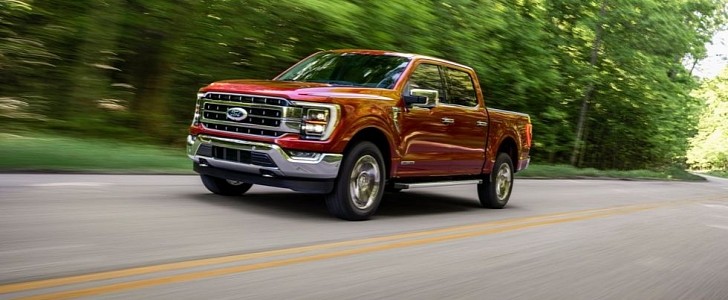A seatbelt system issue in some Ford trucks has led the company, and the National Highway Traffic Safety Administration, to put out a recall for some 2021 Ford F-150 models.
And it sounds like it’s no joke as the company and the NHTSA are telling owners not to drive their pickups until the required repairs have been performed.
The recall affects a total of 16,430 F-150s, but it’s limited to Super Cab body style models only, which were built in 2021 between January 2 and May 27.
So if you need some reassurance, this means that both Crew Cab and Regular Cab F-150 models are not subject to the recall and don’t have the same problem.
According to Ford, Super Cabs utilize a completely different seatbelt assembly than the trucks not subject to the recall, and that explains why the Super Cabs are targeted.
Ford says the issue involves front seatbelt webbing that “may be incorrectly routed.” As a result, the misrouted webbing may possibly cause the seatbelt to not operated correctly and prevent passengers restrained in the event of a crash.
It represents a very serious issue, and that’s why Ford and NHTSA are telling drivers to sideline their 2021 Super Cabs until the necessary repairs have been completed.
If you think your truck might be affected and subject to the recall, you will get instructions in the mail on how you can quickly assess the seatbelts to find if they are deficient. Ford says that if the belts fail their suggested test, Ford and NHTSA says owners “should not drive their vehicle until the repair is performed.”
The repair will ultimately take place at your local Ford dealership.
Vehicle owners can visit NHTSA.gov/recalls and enter their 17-digit vehicle identification number for more information on this recall and to see if their F-150 is affected.
Ford and NHTSA are also encouraging owners to call Ford at this number to get more information about their specific situation and the specific vehicles affected by the problem: 866-436-7332.
The recall affects a total of 16,430 F-150s, but it’s limited to Super Cab body style models only, which were built in 2021 between January 2 and May 27.
So if you need some reassurance, this means that both Crew Cab and Regular Cab F-150 models are not subject to the recall and don’t have the same problem.
According to Ford, Super Cabs utilize a completely different seatbelt assembly than the trucks not subject to the recall, and that explains why the Super Cabs are targeted.
Ford says the issue involves front seatbelt webbing that “may be incorrectly routed.” As a result, the misrouted webbing may possibly cause the seatbelt to not operated correctly and prevent passengers restrained in the event of a crash.
It represents a very serious issue, and that’s why Ford and NHTSA are telling drivers to sideline their 2021 Super Cabs until the necessary repairs have been completed.
If you think your truck might be affected and subject to the recall, you will get instructions in the mail on how you can quickly assess the seatbelts to find if they are deficient. Ford says that if the belts fail their suggested test, Ford and NHTSA says owners “should not drive their vehicle until the repair is performed.”
The repair will ultimately take place at your local Ford dealership.
Vehicle owners can visit NHTSA.gov/recalls and enter their 17-digit vehicle identification number for more information on this recall and to see if their F-150 is affected.
Ford and NHTSA are also encouraging owners to call Ford at this number to get more information about their specific situation and the specific vehicles affected by the problem: 866-436-7332.






